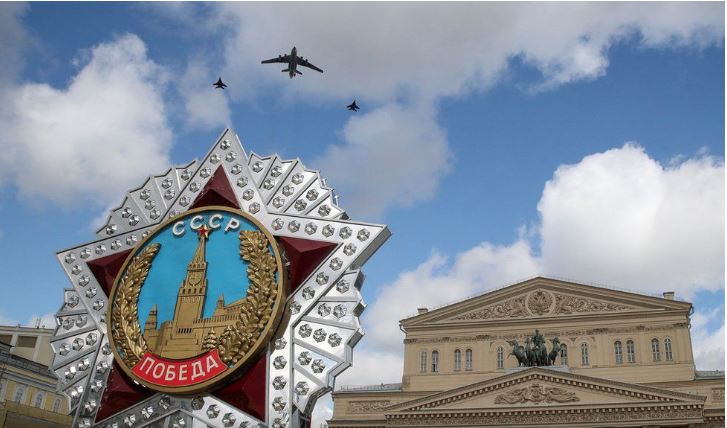The annual military parade in Moscow’s Red Square has a new significance this year, as Russian forces continue their two-month assault in Ukraine. As tanks roll through the city streets, speculation is intensifying over President Vladimir Putin’s next move.
Fighter jets and bombers roared over Moscow earlier this week.
It was just a rehearsal – for a grand military parade and flypast to mark Victory Day.
The ninth of May is one of the most important holidays in the Russian calendar and on Monday there’ll be military processions all over the country to commemorate the Soviet Victory over Nazi Germany in 1945. As always, flags flutter from almost every building and shop windows are decorated with golden stars.
But this year will be different. Russia is at war once again – this time with its neighbour.
And Vladimir Putin may have hoped to have used the anniversary to present the Russian people with a victory of his own in Ukraine. But, following an invasion which hasn’t gone to plan, he’s yet to even accomplish his most recently stated aim to take the Donbas region.
“Everyone is expecting something to happen [on 9 May], both the enemies of Putin and his supporters,” says political expert Abbas Gallyamov, who was once a speechwriter for Mr Putin.
“These expectations created a vacuum that needs to be filled. If it’s not, Putin will lose politically.”
The question of what Mr Putin might do has set analysts guessing and rumours swirling.
The Kremlin has dismissed as nonsense reports that he might use the opportunity to officially declare war on Ukraine – or even the West – and seek to mobilise reservists or even civilians to replenish his depleted army.
But many experts assume that, at the very least, he’ll dress up any territorial gains in eastern Ukraine as a victory worthy of celebration. Though that’s unlikely to mean the end of the war. Mr Gallyamov makes a fascinating prediction, that Mr Putin will then present Ukraine with an ultimatum – come to the negotiating table or choose to fight on and face the threat of a tactical nuclear weapon.
“The only way he can win now, because he’ll definitely lose if it continues, is to produce the impression of an absolutely crazy guy. He wants the western public to get scared, western leaders to get scared and for them to start calling Zelensky and say: ‘Enough now let’s stop this. Go to the negotiating table and agree to at least some of the demands he makes. Because we’re ready to help you but we’re not ready to die because of you.”
Mr Putin, he believes, deeply regrets his invasion and needs a way out without looking weak.
But what do his people think? Opinion polls suggest he has majority support but it’s unwise to fully trust even the independent polling agencies in a country which has criminalised the expression of anything other than the official narrative – that Vladimir Putin’s “special military operation” is an honourable and necessary act of self-defence.
There is opposition but, again, it’s difficult to quantify.
The street demonstrations which accompanied the first weeks of war have dwindled to the occasional individual protest. The independent monitoring group OVD info have recorded more than 15,000 detentions of protesters – most of them in the early days of the invasion.
A recent series of fires at sites with military or tactical significance have prompted speculation about domestic sabotage but there is no conclusive evidence to back the theory, and fires are common here, largely due to old or dilapidated buildings and infrastructure.
But a recent wander through Moscow city centre gave at the least a sense of popular sentiment.
On one pedestrian precinct some of the shops displayed the Z sign, which has become a symbol of support for the Russian offensive. A couple of stores were selling T-shirts featuring the letter. One shopkeeper modelled one rather ostentatiously in his doorway.
Most people walked by, apparently unmoved.
But some did stop to gather around a large and eye-catching display of black and white photographs in the centre of the precinct. Close-up images of the faces of distressed children stared out at them. I noticed one woman wipe tears from her eyes as she looked at the exhibition. These were, the sign proclaimed, the children of Donbas.
It’s one of Vladimir Putin’s pretexts for the war. That his troops are coming to the rescue of the Russian speaking population of eastern Ukraine, who are imperilled by a murderous regime in Kyiv.
And he’s gone to extraordinary lengths to create a parallel reality in which Russia is both defender and victim. And Ukraine and the West are the aggressors.
State TV has long presented the West as Russia’s nemesis but, in the run up to Victory Day, the rhetoric and the aggression has intensified. Presenters rail furiously against America and Europe and their supply of weapons to Ukraine. Echoing the Kremlin, they blame the west for provoking “World War Three” and seeking to prolong the conflict for as long as possible.
It’s a powerful tool. One of the most popular TV programmes in the last few weeks was a talk show in which a presenter warned Britain that, if provoked, Russian could completely destroy it with nuclear weapons.

